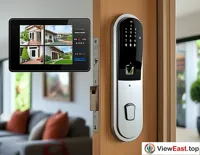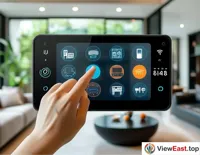







In the wave of digitalization, smart homes are gradually becoming a part of modern life. China, as a significant force in global technological innovation, is leading the new trend of smart home applications with the support of AI technology. From smart speakers to home security, from intelligent lighting to environmental control, China's smart home market is not only vast in scale but also at the forefront of the world in terms of technological innovation and application popularization.
1. The Rise of Smart Homes
The concept of smart homes originated in the 1980s, but it was only in recent years, with the rapid development of AI technology, that this concept truly entered thousands of households. In China, with the maturation of technologies such as the Internet of Things, cloud computing, and big data, the smart home market has witnessed explosive growth. From simple smart plugs to complex home automation systems, the variety and functionality of smart home products have become increasingly rich.
2. Development of China's Smart Home Market
China's smart home market has achieved significant development over the past few years. According to market research reports, China's smart home market size is already among the top globally and is expected to continue growing in the coming years. Behind this growth is China's strong manufacturing capabilities and continuous pursuit of innovative technologies. Chinese tech companies, such as Xiaomi, Huawei, Alibaba, and others, have invested substantial R&D resources in the smart home field, launching a range of innovative products.
3. Application of AI Technology in Smart Homes
AI technology is the core of smart homes. Through voice recognition, image recognition, and machine learning technologies, smart home products can better understand user needs and provide more personalized services. For example, smart speakers can control home lighting, air conditioning, and other devices through voice commands, while smart cameras can improve home security with facial recognition technology.
4. Innovative Practices of Smart Homes in China
Chinese smart home companies are continuously breaking through in product innovation. For instance, Xiaomi's smart home ecosystem covers a comprehensive range of products from smart door locks to smart light bulbs, allowing users to control all smart devices in their home through a single app. Huawei has introduced a smart home solution based on its own HarmonyOS, achieving seamless connection and intelligent collaboration between devices.
5. Smart Homes and the Improvement of Quality of Life
Smart homes are not just a showcase of technology but also a reflection of the improvement in the quality of life. Through smart home systems, users can manage household affairs more conveniently, save energy, and enhance security. For example, smart temperature control systems can automatically adjust indoor temperatures based on user habits, while smart security systems provide real-time monitoring when users are away.
6. Global Influence of China's Smart Homes
With the maturation of China's smart home products and technologies, its global influence is also expanding. Chinese smart home products, known for their cost-effectiveness and good user experience, have been favored by global consumers. At the same time, Chinese smart home companies are actively expanding into international markets, working with partners around the world to promote the development of smart home technology.
7. Outlook for Future Smart Homes
Looking to the future, with the application of new-generation communication technologies such as 5G and 6G, smart homes will have even broader development prospects. Higher data transmission speeds and lower latency will make smart home systems more sensitive and efficient. At the same time, with the continuous advancement of AI technology, smart homes will become smarter and better serve human life.